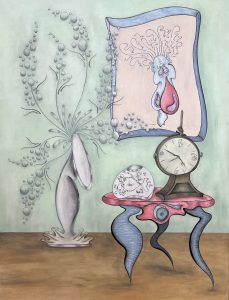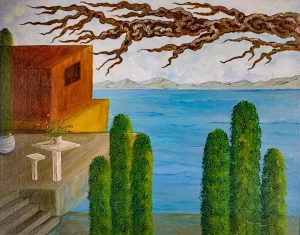Same Story, 2 Perspectives
I recently reread F. Scott Fitzgerald’s masterpiece, The Great Gatsby. As a writer, I habitually revisit fine literature. Lord of the Rings. Of Mice and Men. Hemmingway. Dune. Jane Austen and Virginia Woolf’s entire oeuvre. Over and over. The practice helps me improve my characterizations, my story arcs, and my descriptions. It also helps me to raise my voice in a way no popular writing can.
But the book I read last week is not the one I read when I was fourteen.
What changed?
Convinced I had read two unique books, I decided to investigate. With the advantage of my time machine, I returned to my bedroom the moment my fourteen-year-old self had finished The Great Gatsby.
My appearance in the rocker in the room’s corner did not surprise her. She nodded. “I’m glad you’re here. I just finished this great book.” She held up the Signet paperback.
“I remember,” I said. “I remember loving it.” I waited to broach my visit’s purpose. “Nothing like a classic on a cool autumn evening. People in my time don’t read anymore.”
“Really? That’s sad.” She shifted on her bed and moved a few stuffed animals, including the white kitten with the pink bow. I don’t recall what happened to that one. I still have a few of the others. Nostalgia is a disease I treasure.
“Yeah. Last week, I researched and published an article on readership in 2022.” I leaned back, recalling how much I loved this rocking chair. The faux suede was soft and gold. I spent many a night curled up in it, ingesting book after book. I gazed out the dormer window and enjoyed the line of oaks, their September leaves turning those brilliant ambers and burgundies.
“Life starts all over again when it gets crisp in the fall.” ― F. Scott Fitzgerald, The Great Gatsby
“You’re from 2022? Are we — you — married now?” Her wide eyes met mine.
I smiled. “You’ll see. Let’s not violate the prime directive.”
She returned the smile. “Obviously, we still watch Star Trek.”
I nodded. “Obviously.” I wondered if that admittance violated the prime directive. Whatever. I had a question to answer. “Yeah, today, in your now, almost sixty percent of adults read literature. In my time, it’s less than forty percent. And people who read don’t read twenty books a year. They read twelve. In fact, almost half those who call themselves readers only read one book each year.”
She frowned. I wanted to advise her to stop being so pensive to avoid the forehead wrinkles I bear. She said, “Pathetic. What do they do with their time?”
I hesitated, but said, “It has a lot to do with Atari.”
She pursed her lips. “No way?”
“Yes, way.” I considered saying too much and too little. “And that phone Uncle Joe carries around.”
“That big thing?”
“Yes. And computers.”
“That’s lame.” She moved to the end of the bed and started swinging her legs back and forth. She was wearing those rainbow toe socks I loved. “But we still read, right?”
“Of course. And that’s why I’m here.” I gestured to the book she still held.
She hugged the book. “I loved this one. So romantic.”
I pursed my lips. And there my suspicion confirmed. Nothing about The Great Gatsby is romantic. I need to understand my skewed fourteen-year-old impression. I need to remember. I asked, “What did you find romantic?”
“Well, they still love each other after all that time. Gatsby and Daisy. He never forgets her. And she should have left her husband. He was so mean to her.”
I listened, remembering what she would say. I considered how we expose children to literature. They are far too young to appreciate the themes or even the plots. Of course she would see some tween romantic theme in Gatsby’s pining for Daisy. My tween self could never appreciate how shallow Daisy is. To the little girl on my old bed, adult foible and torment is romantic.
She doesn’t appreciate the vows of marriage. Or the intimacy. The sweet virgin nestled among stuffed bears and that kitten has no experience with relationship promises whispered in the dark in the haze of orgasm. She has never suffered the betrayal of those vows. She has never suspected her partner is untrue. I took a chance and asked, “Did Daisy cheat on Tom?”
“No way. Tom was the cheat.”
“But Daisy is spending her days with Gatsby. In secret.”
“They were swimming in his pool,” she insisted.
I remembered that at fourteen, I had no idea anyone in the book was having sex. The narrator, Nick, is having sex with Jordan. Jordan is probably having sex with several men. And women. Gatsby and Daisy are having their affair by the side of the pool. No one is loyal, but Myrtle’s husband, George.
And none of that is the point of the novel.
But the non-existent romance is all my child-self garnered from her three hours of reading.
“Is it wrong for Daisy to be swimming at Gatsby’s house? Behind her husband’s back?” I attempted to inspire realization. I failed.
“She wants to be loved.” She toyed with the stuffed cat’s ribbon, wrapping it around her ringless finger.
My fourteen-year-old self wanted to be loved. In that moment, I recall that need. I asked, “Why did Gatsby have all those big parties? The ones he didn’t attend?”
She shrugged her shoulders. “I guess he’s showing off.”
“For whom?” I asked.
“That part confused me. He has a lot of friends, I guess.”
To her, parties mean friendship. She does not comprehend the shallowness of Gatsby’s life and efforts. How he stops all the parties once he reconnects with Daisy. Those parties were bait. A flaunting of his new wealth to the woman with old money. My fourteen-year-old self does not understand economics. Or the socio-economic divide. She’s a year from her first fast-food job.
She said, “And Daisy’s so perfect. All her pretty clothes. And her carefree attitude.”
“Gatsby sees her that way. But is she?” I hesitated to give her answers that it had taken me years to earn.
She frowned again, ruining that perfect brow-line for which I pine. “I just thought it was romantic.”
“I know, honey. That’s why I’m here. I wanted to remember what I thought when I was you.” I pursed my lips. “And you are helpful, as always.”
In my recent devouring of the classic, I appreciated the clashing of socio-economic classes — the old versus the new rich. The lack of social graces in the new rich and the dearth of sincerity or culpability in the old rich. Without the context and the experience, the themes are lost on my fourteen-year-old self. She doesn’t even realize that Gatsby earns his money through illegal means. I asked, “What is Gatsby’s business, anyway?”
“He owns pharmacies,” she said, sitting tall and proud to be a star pupil.
Over the years, my hubris has been eviscerated. I don’t tell her his pharmacies are bootlegging and worse. She looked so wide-eyed and fresh. My smile is slight.
Fitzgerald’s masterpiece captures the Roaring 20s. The disillusion after World War I. The conflict between the haves and new-haves. Screw itexpressed through parties, alcoholism, and sexual freedom. Gatsby is obsessed with rekindling the romance with Daisy, a woman of shallow thought and old money. His pursuit of wealth and his materialism is the same as his pursuit of Daisy. His actions represent his desire to transcend his birthright and to secure the lineage and reputation he desires. And as the world rejects him — doesn’t know him — Daisy rejects him for the posh of her marriage and the rank of her spouse. Not only does she reject Gatsby, but she rejects him with little flourish. He meant nothing to her. She is done with her plaything, and she is immune to consequences.
Not only is love not present but also the entire novel is a mockery of the American Dream. And, there, on that bed, in my past self, I identify the desire to pursue the American Dream. And I want to tell her the truth. But she would need to earn that truth.
And I can’t tell her the romance she will find is living life and learning that truth.
I asked, “What’s your opinion of Jordan?”
She curled her lip. “The one who cheats playing golf?”
I laughed. “Yes, she does that.”
“I don’t like her. I’m glad Nick rejects her. She seems so fake. Like that girl at school we don’t like.”
My brow furrowed. Which girl at school? Then I consider my younger self has the seeds of awareness that will grow into an intuitive sequoia. I said, “Don’t you pity Myrtle?”
“The dead lady? Sure, I guess. She was a bit crazy.”
I nodded and asked, “What makes her unhinged?”
She frowned. “I guess she loved Tom so much and didn’t realize he wasn’t in the yellow car.”
Oh, to be fourteen. She read the novel through her virgin, dreamy eyes. While I’m in love with her, with my innocence, I pity her, too. Life lessons will tear her hypersensitive, romantic self to pieces.
“I hope she’ll be a fool — that’s the best thing a girl can be in this world, a beautiful little fool.”― F. Scott Fitzgerald, The Great Gatsby
Is my child self a beautiful little fool? I said, “I remember thinking your thoughts.”
“But you changed? I changed?” She winced with her words.
Youth, with its scarless optimism, projects its own dreams into the story. To her, there’s the promise of love and passion. Of love returned. Of injustices righted. Of valor and honor. My child-self read The Great Gatsby and implied the romance and passion she desired. To have a man pursue a woman across distances. For him to raise his life to offer her his best. For him to demand she leave a loveless marriage so he could love her only.
Very romantic.
The novel held none of those images for my adult self. A man obsessed with material power. To cajole the fling of his youth into his life as a prize. A medal for his success. To win Daisy was to become wealthy and successful. She was a mere cherry on his sundae.
Daisy remains in a miserable marriage to maintain appearances and status. The murder of his mistress inconveniences her philandering husband. To protect his own status, he whisks away his wife, the one guilty of the homicide, negligent or not.
And Myrtle, in the belief she was destined for more than her mechanic husband, desirous for a better life, pursues an unrealistic status to her death. The unwilling commentator, her aggrieved husband, reminds us that God is watching. In his madness, he takes Gatsby’s life and then his own, wiping the slate with only tears and loss.
Love is absent. The fine qualities to which I aspire are missing. I read about avarice and guilt, hedonism and materialism, socioeconomic division, manipulation, and fantasy. These forty years from the first time I scanned those pages have left me with the conclusion that in one-hundred years, the human condition has remained unchanged. I recall Jay Gatsby’s words:
“She thought I knew a lot because I knew different things from her”― F. Scott Fitzgerald, The Great Gatsby
“We change, yes.” I couldn’t help but offer her our smile.
Our eyes met. She flipped the pages of the book and read aloud:
“He smiled understandingly-much more than understandingly. It was one of those rare smiles with a quality of eternal reassurance in it, that you may come across four or five times in life. It faced — or seemed to face — the whole eternal world for an instant, and then concentrated on you with an irresistible prejudice in your favor. It understood you just as far as you wanted to be understood, believed in you as you would like to believe in yourself, and assured you that it had precisely the impression of you that, at your best, you hoped to convey.”
She closed the book and placed it on her lap. “Some things about me will change. But not everything. Not who I am. Not really. I’m okay with that. With changing. With learning.” She returned our smile to me.
With teary eyes and a tight throat, I whispered, “Me, too.”



